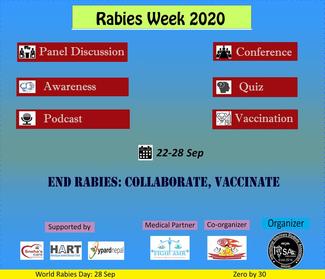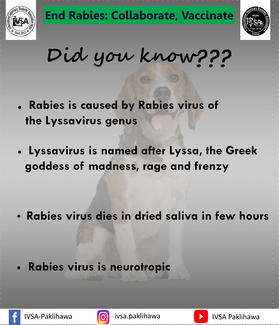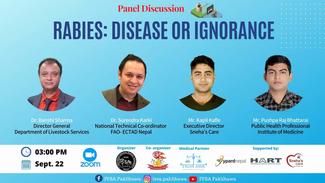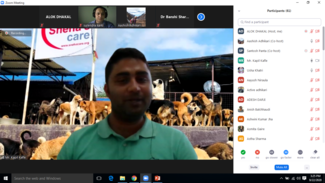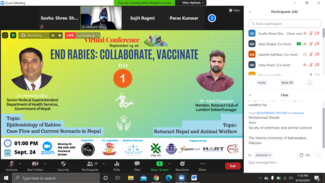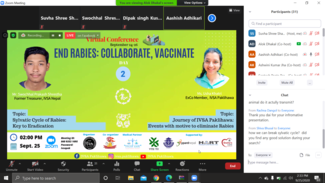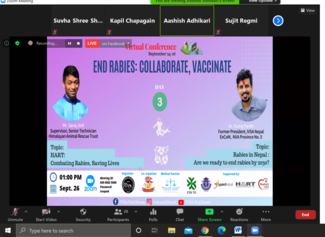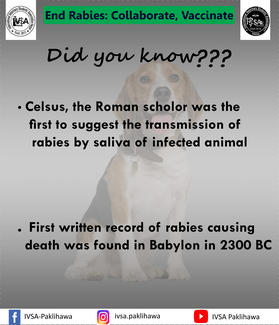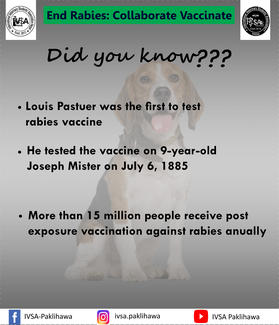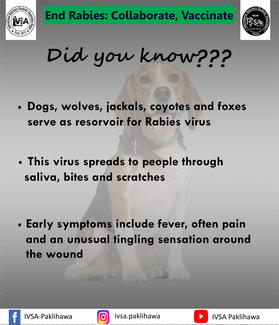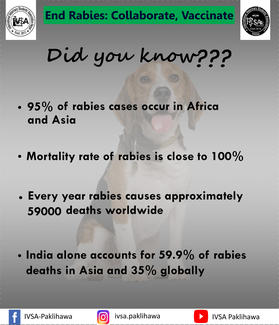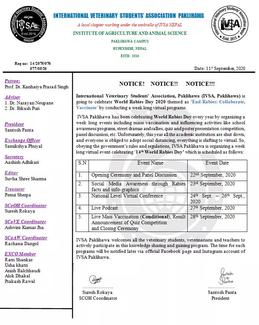
International Veterinary Students' Association, Paklihawa (IVSA, Paklihawa) is a group of enthusiastic veterinary students of Tribhuvan University, working as a sister organization under national Member Organization; IVSA Nepal. Since its establishment, IVSA Paklihawa has been tirelessly attempting for animal and community welfare through various activities including awareness, vaccination, animal health camps, workshops, and trainings, etc.
IVSA Paklihawa celebrates every important dates from the veterinary calendar by organizing series of animal welfare activities incorporating all the veterinary students and veterinarians of the university with animal health workers in the society since its establishment. It has left a strong mark in the university through its remarkable activities. Similarly, we have been celebrating World Rabies Day every year by organizing a week long events including mass vaccination around Siddarthanagar Municipality, school awareness programs through handmade posters and pamphlets, influencing activities like street dramas and rallies, quiz and poster presentation competition in the university, panel discussion, etc.
Unfortunately, this year all the academic institution are shut down and everyone is obliged to adopt social distancing and everything is shifting to virtual. So, obeying the government’s rules and regulations, IVSA Paklihawa plans to organize a week long events celebrating ‘World Rabies Day 2020’ going virtually this year. This week long campaign will not only contribute to meeting 0 by 30 but also will provide informative knowledge to people about Rabies.
The list of campaigns:
1) National Level Virtual Conference on Rabies with the theme - End Rabies: Collaborate, Vaccinate
This conference will incorporate all the local chapters of IVSA Nepal and will have speakers from diverse organizational background working in public sectors including animal welfare activist (Rotaract Club of Lumbini, Siddarthanagar and Himalayan Animal Rescue Trust), medical (Alliance against AMR) professionals and pass out graduate senior. Different topics will be allocated to all the speakers. On this conference, a member from each organization represent themselves with a presentation with the theme relevant to the activities the organization serves for rabies safety in the community. The conference will last for 3 days, 6 speakers and 1-2 hours each day. Not only this, interactive sessions will also be conducted in between to engage the participants. The knowledge and experience of the speakers will surely benefit the veterinary students and veterinarians of Nepal.
2) Live mass vaccination
As our country Nepal is facing COVID-19 pandemic and public gathering is prohibited, the members of IVSA Paklihawa will be separately mass vaccinating the street dogs with antirabies vaccine in their own district (Kathmandu, Pokhara, Kavre, Lalitpur, Bhaktapur, Biratnagar, Doti, Surkhet, Chitwan, etc.). This will cover almost every thematic districts of Nepal. Somehow, this will be a nationwide mass vaccination campaign with combined efforts of every committee members. The vaccination will also be live in social media and the video will also be recorded. The campaign will undergo entire week with the feasibility of the members.
3) Social Media Awareness Campaigns
This campaign will include : Online Video Sharing, Panel Discussions with experts including OIE delegate of Nepal(Dr. Banshi Sharma), Epidemiologist (Dr. Surendra Karki), Animal welfare activitist (Mr. Kapil Kafle) and Public Health Professional (Mr. Pushpa Raj Bhattarai) with theme : Rabies : Disease or Ignorance?, Live Podcast between pass out Graduate and member of IVSA Paklihawa (Theme : Outline on Rabies and it's extremities), Infographics from OIE and GARC, etc.The facts on Rabies will also be shared from the official Facebook page of IVSA Paklihawa from 18th September and similarly, online quiz competition will be held for the Rabies Week in official Instagram page of IVSA Paklihawa and the top 3 winners will be given cash prizes as well. First, second and third winners will get Rs. 2000, Rs. 1000 and Rs. 500 respectively.
Day 1 : Panel Discussion (Rabies: Disease or Ignorance)
On 22nd September 2020, International Veterinary Students’ Association, Paklihawa (IVSA, Paklihawa) successfully conducted inaugurating program of the week long events for the celebration of "World Rabies Day 2020" named Panel Discussion on topic “Rabies: Disease or Ignorance” themed ‘End Rabies: Collaborate, Vaccinate’. There were the involvement of diversified panelists consisting OIE delegate of Nepal, human health expert, animal health expert, epidemiologist, and animal welfare activist of Nepal. The session was hosted and moderated by Mr. Aashish Adhikari (Secretary, IVSA Paklihawa).
The session started with brief introduction of every speaker and welcome speech from Miss. Suvha Shree Sharma (Editor, IVSA Paklihawa) and proceeded with questions from IVSA Paklihawa team to the panelist one by one. The answers summary of each speaker is enlisted below:
1) Dr. Banshi Sharma (Director General, Department of Livestock Services, OIE Delegate of Nepal):
Cases of deaths caused by Rabies in Nepal, stressed on the association of the Institution more towards animal health services than human health. He added that the 1.5 lakhs doses are currently being provided as post bite vaccination and the institution aims towards 10 lakhs dose production. He emphasized more on the importance of upgrading the quality of vaccine development and making Nepal self- dependent on vaccines.
Cross border issues are present but the cases of rabies in Nepal are based more on the sylvatic cycle. Regarding such issues local and state governments need to be held responsible so such issues are controlled much efficiently. The department is currently working on the ‘Step Wide Approach towards Rabies Elimination’ project. He added that this approach will bring much better outcomes in the future days.
Regarding the goal “Rabies zero by 30”, he explained that rabies is considered as a neglected zoonotic disease but is equally important and is given much priority. He insisted that persistency on working towards the goal is much important if the goal is to be met.
Graduate veterinarians are employed on the Rabies Vaccination programs along with collaboration of the local and state governments. NGOs and INGOs are also involved in the programs. He also added how the current pandemic has overshadowed the rabies situation this year and the interventions that were to be brought. He finally concluded by highlighting the importance of awareness for effective rabies elimination.
2) Dr. Surendra Karki (National Technical Co-Ordinator FAO-ECTAD Nepal):
Origin of Rabies may have come from ancient times. The wild animal intimacy may be one of the major causes. Even in Sanskrit or Latin, one can find the related words. However, the record for collection of data is difficult to find before 60-70 years. Since1980s, official programs related rabies awareness and control have been conducted. It can be transmitted from dogs, wolves, mongoose, bats (no record of bats transmission found in Nepal). The sylvatic cycle has promoted a lot in transmission. Nearly less than 100 people die in the country annually. While in the records of 2015/16 only 6 people died, in 016/17 there was record of 8 death, and in 017/18, the case was increased to32. This rate is smaller than other countries. Many control programs are being carried out annually.
Greater risk of rabies transmission is seen especially due to its distributed occurrence viz. Jhapa, Dolakha, Ramechhap. Database system is also not sufficient and there is no proper collaboration and synchronization of human database system. Lack of proper research is also one of the hindrances in controlling rabies. The different Public Health institutes/ universities and veterinary institutes/ universities should conduct such research programs to help to understand the situation ad control it.
Many NGOs collaborating with different local veterinary offices have been trying to control the rabies. But it is quite a difficult task to maintain herd immunity. Continuous vaccination in different areas can help to maintain the herd immunity. Post-exposure prophylaxis is also aiding much. The data reporting system should be improved. Many NGOs help to vaccinate but due to irregularity, situations like one dog getting many vaccines and others left unvaccinated have occurred more often. One health approach must be followed. The population management of the stray dogs is also one of the major factors to aid in controlling rabies. The population has sustained a lot may be due to ill-way of waste management. Food availability from meat shops or different kinds of wastes has assisted in sustaining stray dog population. National rabies control strategies in coordination with FAO, EDC, NGOs, government bodies should be made to help in controlling rabies. Massive dog vaccination, documentation of dog bite cases, global alliance also assists in the rabies control.
Local government bodies should act in leading roles. Cold chain maintenance is a must. Uniformity in annual vaccination should be maintained. The population control strategies should be applied as far as possible.
"We only live once, let's not die from rabies!"
3) Mr. Kapil Kafle (Executive Director, Sneha’s Care):
Sneha’s care is an organization that works for Animal welfare which was founded in 2015 AD by animal advocate Sneha Shrestha.
Moto of Organization: To prevent stray animals from abuse.
Working area is especially Kathmandu valley.
Its activities include castration, treatment, antirabies vaccination, adoption of community dogs. Also educate and works in advocacy, coordinate with government, labs, veterinary offices, and organizations for animal welfare.
This organization focuses on treatment, mass vaccination and sterilization. Till now 26,000 antirabies vaccine have been already given. Since previous year, more than 5,000 dogs are vaccinated annually. So, this helps in decreasing the risk of rabies transmission in human.
Staff security is our high priority, so they are previously given the pre exposure vaccine. They use the rabies gloves while approaching the dogs to prevent contamination. If accidently bitten, they are sent for re-exposure vaccine. Every 25 rescue dogs contain 1 rabid dog.
New Application is used which uploads the data of vaccinated community dogs.
He also suggested to form separate National rabies control committee to control rabies.
There should be the environment of easily accessible for vaccines.
There should be good coordination with lab, NGOs, municipality, and other local organizations.
4)Mr. Pushpa Raj Bhattarai (Public Health Professional, Institute of Medicine):
There is slight difference between pre exposure and post exposure vaccination against rabies but provide equal protection. Pre exposure is given to high risk factors such as veterinarians, forest officers etc. Also, to those who can't reach easily to the post exposure vaccine against rabies soon after being bitten by rabid animals. Pre exposure is to minimize risk and aids in reduction in indication of Immunoglobin. Post exposure is applied after bite.
If vaccination against rabies is not possible within 24 hrs. after bitten by rabid animals, then high care to the wound is the most. Wash the area with soap water for about 15 minutes so that infection couldn't spread. For minimization of the risk vaccination should have to be done as soon as possible. Moreover, the vaccination dose is given by 0, 3, 7 and between any one day from 14 to 21 day after being bitten by rabid animal if the vaccination is given Intramuscularly. The 0 counts as the day of injection not the day as the dog bite.
Also, we can vaccinate pregnant and lactating women. There is no contradiction as others to vaccinate.
Normally it is seen, Pre exposure is seen working effectively for 3 months. After that two practiced are adopted as: Annual Booster dose if no any bite for a year after 3 months of pre exposure vaccine and in case of being bitten by unvaccinated dog (or Re-exposure) after 3 months of pre exposure vaccination, 2 dose at 0 and 3 day is given.
We were also accompanied by Mr. Suraj Bhattarai (President, Rotaract Club of Lumbini, Siddharthanagar) who serves as co-organizer for the program. Similarly, there was auspicious presence of Mr. Nayan Neupane (Senior Executive Officer of National Student Committee) as a representative of Alliance against AMR along with other members of the organization who is the medical parter of the program. Similarly, the program was supported by NVA Province 5 and we had Dr. Yuvraj Panth as representative from it. Himalayan Animal Rescue Trust (HART) and Young Professionals for Agricultural Development (YPARD, Nepal) served as program partners.
The program was interactive and informative and lasted for almost 2 hours. There were more than 75 participants in the program who enthusiastically listened all the speakers till the end. The session ended with wonderful and remarkable words from Miss. Samiksha Phuyal (Exchange Officer, IVSA Paklihawa).
Day 2: Various infographics of OIE and GARC with facts about Rabies were posted from the official Facebook page of IVSA Paklihawa.
Day 3 to 5: National Virtual Conference On Rabies themed "End Rabies: Collaborate, Vaccinate"
From 24th to 26th September 2020, International Veterinary Students’ Association, Paklihawa (IVSA,Paklihawa) successfully conducted 3rd, 4th and 5th day program named “National Virtual Conference on Rabies” out of weeklong schedule for the celebration of “World Rabies Day 2020” themed ‘End Rabies: Collaborate, Vaccinate’. There was the involvement of diversified speakers from different sectors including human health sector, veterinary sector, animal welfare sector and social services sectors.
The session was hosted and moderated by Mr. Aashish Adhikari (Secretary, IVSA Paklihawa). The program was co-organized by Rotaract Club of Lumbini, Siddarthanagar and Alliance against AMR as medical partner. The program was supported by Himalayan Animal Rescue Trust (HART) and Young Professionals for Agricultural Development, Nepal (YPARD, Nepal).The session started with brief introduction of every speakers and proceeded with presentation from particular speaker in mentioned date and time on mentioned topic as above.
The session's speakers with their topics are:
Dr. Hemanta Ojha: Epidemiology of Rabies: Case Flow and Current Scenario of Nepal
Rtr. Kapil Chapagain: Rotaract Nepal and Animal Welfare
Mr. Swochhal Prakash Shrestha: Sylvatic Cycle of Rabies: Key to Eradication
Miss. Usha Khatri: Journey of IAAS Paklihawa: Events with motive to eliminate Rabies
Mr. Saroj Jirel: Combating Rabies, Saving Lives
Dr. Yubraj Panth: Rabies in Nepal: Are you ready to end Rabies by 2030?
The answers summary of each speaker is enlisted below:
- Dr. Hemanta Ojha (Senior Medical Superintendent, Department of Health Services, Government of Nepal):
In Nepal recently, department of health and services is regarded as focal part as one health and zoonotic disease are the main subject to be concerned. So, we work directly in cooperation with Animal Health. Globally about 90-95 % are dog mediated rabies nowadays. Major parts to be focused are: Dog population Management, Surveillance, and Vaccinations. There are 3 categories of vaccinating as:
- 1st: if only lick and skin contact condition, no need vaccination.
- 2nd: if there are minor injuries, scratch, bite but not much bleeding then immediate vaccination and health care is must.
- 3rd: multiple bites, more bleeding, severe exposure then immediate vaccination with Immunoglobin.
Also, if wild animals’ bites, then it is considered as 3rd category too. There is not such documentation on Rabies caused by rodents, squirrels in Nepal. Also has provide free vaccinations in some places. National Guideline for Rabies Prophylaxis in Nepal 2019 has been published.
- Rtr. Kapil Chapagain (Member, Rotaract Club of Lumbini, Siddharthanagar):
He firstly introduced us about the Rotaract, its formation and its Moto. He presented the total Rotaract club and membership in worldwide and in Nepal. There are many universities based Rotaract clubs also. Rotaract Nepal conducts various programs based on Animal welfare like Rabies prevention, Animal Health camp, rally against animal welfare, management of freedom street animals, etc. He also made us clear about the funding source and lastly suggested the veterinary students to be the part of it for more effective programs further.
- Mr. Swochhal Prakash Shrestha (Fromer Treasure, IVSA Nepal):
He had divided his presentation in 5 groups. Firstly, he briefly gave the introduction of rabies, its transmission, and rabies-based facts. Then he discussed about the epidemiological cycle and worldwide distribution of rabies with map. After that he presented about the Sylvatic cycle of rabies which is also known as enzootic or wildlife cycle. He presented various historical cases in wildlife. Finally, he concluded his presentation with various rabies control measures practiced in wildlife like population reduction and by oral mass vaccination.
4) Miss. Usha Khatri (ExCo Member, IVSA Paklihawa)
She presented on the activities done by IVSA Paklihawa before and since its establishment. As IVSA Paklihawa was established on Dec. 2016. But the initiative action with the motive to eliminate rabies was started since September. 2016. 2016 was a day long program with, Awareness and Vaccination. Since 2017 officially IVSA Paklihawa conducted weeklong program each year to celebrate Rabies Week upto today (2020). IVSA Paklihawa Rabies Week Program 2017 under the chairmanship of Dr. Rupak Pandey: Included Awareness, Rally, Street Drama and Vaccinations. IVSA Paklihawa Rabies Week Program 2018 under the chairmanship of Dr. Subash Belbase included: Inauguration and PPT on Rabies, School Awareness, Rally, street drama and vaccinations. IAAS Collective Campaign on Rabies Awareness 2019 under the chairmanship of Mr. Santosh Panta. The year, where all the NGOs Collab with IVSA Paklihawa in the program. The program was scheduled as: Opening ceremony and Poster Presentation, Public Awareness, School Awareness, Street Drama, Rally and Vaccinations. IVSA Paklihawa Rabies Week Program 2020 under the chairmanship of Mr. Santosh Panta Scheduled as: Quiz contest, opening ceremony and panel discussion, National level Virtual Conference(3days), online awareness through info graphics, Live Podcast Closing Ceremony and announcement of winners of Quiz contest and Vaccinations (conditional )
5) Mr. Saroj Jirel (Supervisor, Senior Technician Himalayan Animal Rescue Trust):
He presented almost all the efforts done by HART (full form) in animal welfare especially in dog neutering and population control. Not only in Pokhara, but also in other districts HART has done Satellite Neutering Programs in collaboration with local municipalities. HART has also done collaborating working - intensive surgical training at veterinary college providing surgical skills to the students. In addition to it, HART has conducted various educational and awareness programs about dog bite prevention, rabies information’s and importance of sterilization. He has also discussed about the summary of HART programs in all 7 provinces and shown the data of total number of dogs neutered viz. 21207 and mass vaccination against rabies 34350. For avoiding duplication, he stated that the different institutions use WWW. dogdata.uk for sharing information’s that enables all animal welfare workers to see what work is done at which places. In a nutshell, he had shown all the successes achieved and strength of the organization.
- Dr. Yuvraj Panth (Former President IVSA Nepal, at present ExCoM at NVA Province No. 5):
Starting with the facts and epidemiological status of rabies in Nepal, he mentioned people's understanding and way of behavior about the dog mediated human rabies. He also summarized the global framework for the elimination of rabies by 2030. National guidelines for rabies prophylaxis (2019) were discussed. A brief scenario of the stray dog population in the Kathmandu Metropolitan City was shown. Last year’s statistics of death of human and cattle viz. 32 and 500 respectively was depicted in the presentation. He also mentioned the events registrations at Global Alliance for Rabies Control (GARC) from Nepal to celebrate World Rabies Day. He also focused on the hindrance to achieve the target 'Zero by 30' and suggested coordination of human specialists with veterinarians, vaccination, awareness, improvement in health facilities, canine population management as effective measures with one health approach.
The program was interactive and informative. There were more than 40 participants each day in the program who enthusiastically listened all the speakers till the end. Last day, the session ended with wonderful and remarkable words from Miss. Samiksha Phuyal (Exchange Officer, IVSA Paklihawa).
Day 6: Live Podcast on Rabies - "Outline of Rabies and it's Extremities"
On 26th September, 2020 IVSA Paklihawa conducted a live podcast on Rabies with theme "Outline of Rabies and its Extremities". The speaker of the podcast was Dr. Tikaram Khanal (Veterinary Clinician at Valley Health Clinic, Kathmandu) and the program was moderated by Ms. Pema Sherpa (Treasurer, IVSA Paklihawa). The discussion was carried out on why the Rabies day is celebrated, and the cases he have handled in his practice. Similarly, the sign and symptoms shown by animals and its duration, transmission cycle, wound management, Pre and Post exposure vaccination prophylaxis, fatality of the rabies, use of meat and dairy products from rabies infected animals, and few words of advice for eradication of disease and meet 0 by 30. The questions were raised as was it necessary to vaccinate yourself if the dog was vaccinated before, contraindication during PEP Vaccination, etc. The session was really interactive and informative and participants were satisfied with the program.
Day 7: Announcement of Result of Quiz and Live mass Vaccination
Event images
